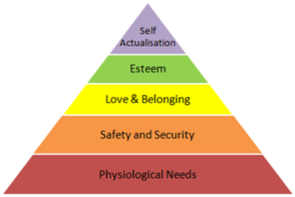do not worry
 “It’s a disaster!” cried out one of my teenage children, clearly distressed. “What’s wrong?” enquired their father, sympathetically, and with genuine concern. “The Wi-Fi* has gone off!” came the reply. Paternal interest rapidly evaporating, my attention was drawn back to the interrupted task, but only for a moment as a further – slightly more significant – piece of information was passed my way. “And the power seems to be off, too.” Now I was more interested. Had a fuse tripped? We had had problems with a kettle recently, and I wondered if the issue had recurred. But no, it turned out that the problem was not limited to our household, but a significant part of the village was without power, causing no small degree of domestic and commercial disruption. But other than an inability to keep up with social media for an hour or so, and having to make a cup of tea by boiling water over a gas ring rather than using a kettle, our household was not significantly affected by the short-term disruption to the power supply.
“It’s a disaster!” cried out one of my teenage children, clearly distressed. “What’s wrong?” enquired their father, sympathetically, and with genuine concern. “The Wi-Fi* has gone off!” came the reply. Paternal interest rapidly evaporating, my attention was drawn back to the interrupted task, but only for a moment as a further – slightly more significant – piece of information was passed my way. “And the power seems to be off, too.” Now I was more interested. Had a fuse tripped? We had had problems with a kettle recently, and I wondered if the issue had recurred. But no, it turned out that the problem was not limited to our household, but a significant part of the village was without power, causing no small degree of domestic and commercial disruption. But other than an inability to keep up with social media for an hour or so, and having to make a cup of tea by boiling water over a gas ring rather than using a kettle, our household was not significantly affected by the short-term disruption to the power supply.
But the incident did get me thinking about what it is in our lives that we consider to be essential, how much we strive to keep those things in place, and how much we build our lives around them. For my teenage offspring, free Wi-Fi is considered a basic human need (and the main significance of electricity being to ensure that the Wi-Fi stays on). Most people across the world would consider something like clean water to be of greater importance, its absence for a relatively short time making human life impossible. But then how does one compare the importance of this to that of the very air we breathe, without which we could not last more than a few minutes? And what about the non-physical things, such as the safety and security of the place in which we live, from both hostile human forces and the forces of nature? What about the need for the care and companionship of other humans, and human love, even? How far would we get in life without them?
Many people will be familiar with Maslow’s hierarchy of needs. Abraham Maslow was an American psychologist who proposed a theory describing how humans require fundamental needs (such as food and clothing) to be met, before intermediate needs (such as safety and belonging) can be addressed, which themselves need to be met before individuals are able to have their ‘highest’ needs (e.g. self-esteem and self-actualisation) met. Many people think in those terms, and of course it makes a lot of sense. How interested can someone be in studying literature or music if they don’t know where their next meal is coming from?
But Jesus provocatively turns Maslow’s famous pyramid on its head. Half way through his Sermon on the Mount, having taught about prayer and our attitude to possessions, Jesus says,
“I tell you not to worry about your life. Don’t worry about having something to eat, drink, or wear. Isn’t life more than food or clothing? […] Don’t worry and ask yourselves, “Will we have anything to eat? Will we have anything to drink? Will we have any clothes to wear?” Only people who don’t know God are always worrying about such things. Your Father in heaven knows that you need all of these. But more than anything else, put God’s work first and do what he wants. Then the other things will be yours as well.”
Matthew 6:25, 31-33 (CEV)
Gosh. Challenging words! Is Jesus saying we should neglect our basic physiological and psychological needs, and go and sit on a mountaintop contemplating eternity?! No. The challenge he is giving is not to worry about the basic things of this life, but instead to direct our thoughts – and the actions and emotions that follow – to God who is our loving heavenly Father, who knows we need all these things, and is the ultimate source of them all. It is a question of putting God and his will first, rather than living life according to our own priorities. That is the life of the Christian disciple, and the only way to escape the tyranny of worry and to gain genuine self-realisation and fulfilment.
Revd Dr Jonathan Mobey
Rector of Harwell and Chilton
May 2017
* Wi-Fi is the signal that enables devices like mobile smartphones and laptop computers to connect to the internet without a physical, wired connection